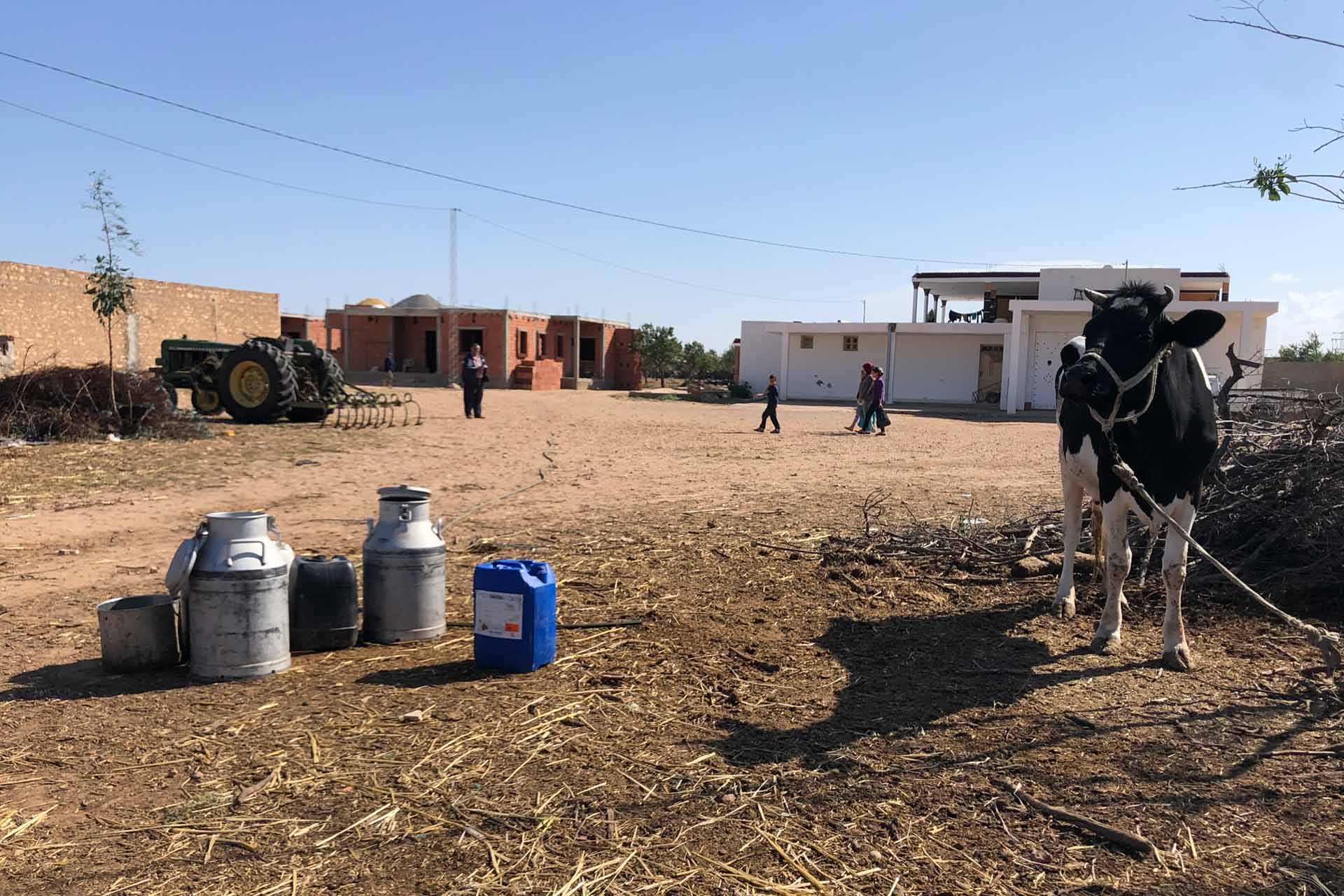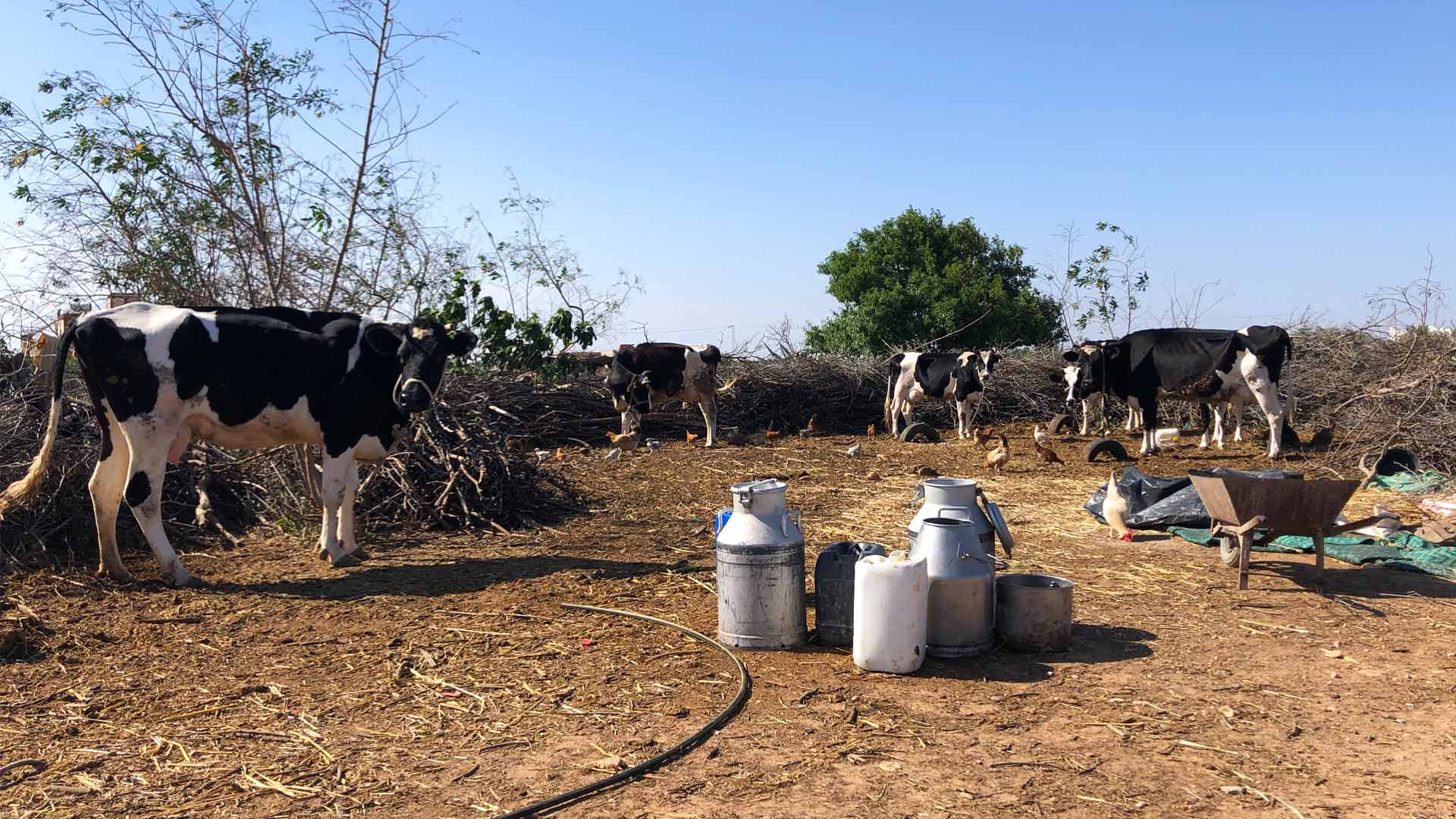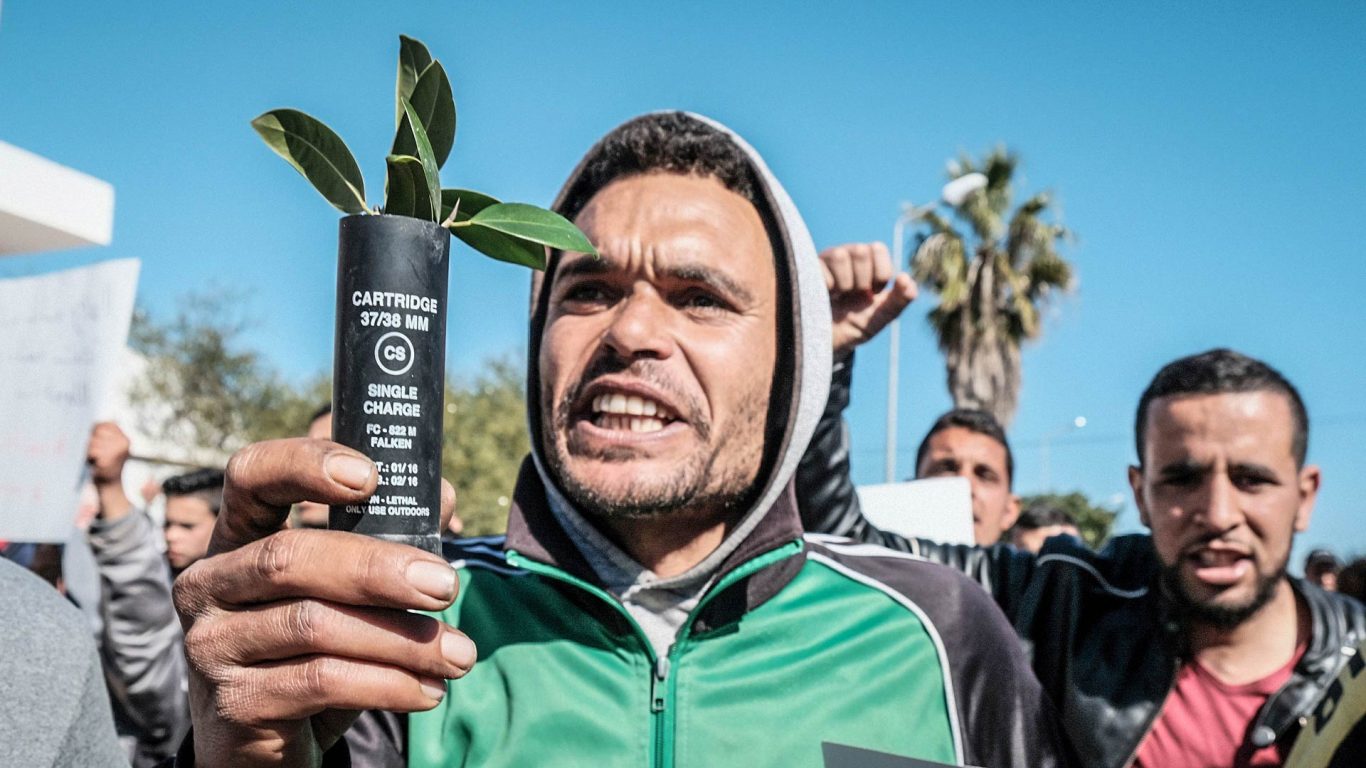The price of a 50-kilogram bag of fodder went from 48 dinars to 79 dinars. This "disproportionate" increase, as described by the Ministry of Commerce in a statement, came as a surprise to Raouf, a small farmer from Mahdia.
According to Raouf, the situation has been tough for some time, but the recent increase in fodder prices is "catastrophic". He said, "Even if we milk 30 liters per cow every day, it won't be enough to cover the increase that took place." This price hike has been standardized by most manufacturers of compound feedingstuffs, especially those used in dairy production.
The implementation of this increase would have led to a revaluation of several products, namely: a 200 millimes increase in the price of four eggs, 400 millimes in the price of a liter of milk, and one dinar in the price of poultry, as explained Lotfi Riahi, President of the Tunisian Organization for Consumer Information, to Shems FM radio.
The Minister of Agriculture, Mahmoud Elyes Hamza, explained in an interview on national television that the selling prices to consumers will be reviewed to secure a profit margin for producers, he said: "new decisions will be announced May 12, the celebration of the agricultural evacuation, including decisions on selling prices”. As for the impact of the increase in raw material prices, the Minister urged consumers and users to support Tunisian agriculture in this delicate situation.
" What is the reason for the increase in consumer prices? Can a person with a low income buy eggs and milk at high prices?" protested Nizar Tissaoui, 42, a livestock producer in one of the northern rural areas in Jendouba, commenting on the Minister's statement.
Nizar stated that the farmer is also a consumer and that fodder prices should not go up. Instead, they should be adapted to the farmer, so that dairy products do not become more expensive for the consumer.
A wave of farmers protests in dairy basins
On the road from Boussalem to Jendouba, farmers gathered and blocked the street in protest against the rise in fodder prices. In Mahdia, small farmers camped out in front of the Vitalait factory, where they poured out milk and spent nights in harsh conditions, refusing to leave the premises until their demands were met.
In Sejnan, farmers grabbed their livestock and blocked the road, threatening to use their entire annual wheat crop to feed their cows as a result of the increase. Within a week, there were numerous farmer's vigils and days of protest in front of the headquarters of several Governorates.
35-year-old Khaled participated in the sit-in outside the Central Dairy of Mahdia. He is a livestock producer in the region of Ouled Jaballah. The young farmer decided to join different protest movements with fellow farmers, and to resort to drastic actions in case of refusal, because cow farming is the only livelihood for him, his brother and their parents . "They don't know our condition, they just decide to increase the price of the bag by 15 dinars overnight. What am I supposed to do? This is our only means of subsistence. Not a single one of us is employed, or has a steady monthly salary, any other source of income, or even other agriculture," he said.
Hamdi Guiza, a member of the Coordination of Small Farmers in Ouled Jaballah, said that the movement began "by blocking the roads at the local level, at the level of the road between Jbeniana and Ksour Essef to then take a regional and national dimension."
Subsequently, arrangements were made with the Coordination of Small Farmers in the region and in the northern and northwestern regions during the first days after the price hike, as the young farmer recalled. Hamdi explained: "We invited the farmers of the region to a meeting. They all agreed to intensify the protest. Eventually, only a sit-in was planned since it was the most effective."
In the region of Sidi Bechir in Jendouba, Nizar is facing a similar situation. He started selling his cows about 3 years ago as a result of the progressive rise in fodder prices. "This increase is not the first of its kind, but it's the most severe one", according to him. His cow breeding has been "impacted by the high living costs and work has become unprofitable," he added: "If this goes on, I will also have to sell the only cow I have left."
The protest has quickly gained momentum, especially among farmers in Mahdia. Those in Ouled Jaballah and the surrounding area have decided to refrain from selling milk to collectors. This decision applies to the entire Mahdia Governorate and a number of regions in the Monastir and Sfax Governorates. Farmers in some regions have also stopped buying fodder.
"We decided to pour out the milk instead of selling it, as a symbolic protest movement, because we had been selling at a loss, and we were hoping things would get better, but they only got worse." Raouf, Ouled Jaballah
The farmers' demands in the sit-in can be boiled down to two requests: the first is the inclusion of compound fodder in raw and subsidized materials, and a profit margin fixed at a rate not exceeding 5%. The second is the adoption of a law that would require an increase in dairy and poultry production prices in the event of an increase in production costs.
Meanwhile, the Vitalait group issued a statement after the sit-in to declare that "the Central Dairy of Mahdia is not the one that decides to raise the milk purchase price. After all, milk, as we all know, is priced by the state, and the company acquires it from farmers for the current prices."
A few days after the sit-in was announced, the President of the Republic, Kais Saied, contacted the representatives of protesting farmers to tell them that he "sees and hears them" and promised to " confront monopoly companies and hold them accountable," according to their testimony.
"Rising production costs against fixed sale prices"
Compound feedingstuffs account for about 70% to 80% of the production cost of products intended for consumption, such as milk and eggs, according to a statement by the Minister of Agriculture. As a result, rising fodder prices disrupt the dairy production system. " The increase in fodder prices leads to higher production costs, and consequently the price of a liter of milk becomes quite steep," said Bilel, a technician at the milk collection center in Boussalem.


The price of the ton increased by about 300 dinars between April 30, 2022 and May 5, 2022 - Jendouba
The young technician actually believes that the milk production system started to crumble three years ago due to the incremental increase in the price of compound feedingstuffs. "In 2017, the four collection centers in the region received about 70 000 liters of milk per day. That amount has now dropped by half or more, sometimes not exceeding 30 000 liters. Farmers are selling their cattle and aren't willing to keep raising them."
"We buy a kilo of fodder at 1340 millimes, while we sell a liter of milk at 1140 millimes. A kilo of fodder is more expensive than a liter of milk, which doesn't make sense." Nizar Tissaoui
About a year ago, an uprising erupted among small farmers in the Ouled Jaballah region of Mahdia for the very same reason. "We negotiated with a delegation from the Ministry of Commerce last year. The Minister, who used to be the Director General, was among them, and proposed to enact a law to include compound feedingstuffs in subsidized commodities. They informed us that the bill depended on the signature of the former Prime Minister, Hicham El Mechichi." On this note, Bilal blamed "the feed production and supply lobbies that resort to monopoly and put pressure on the government to abort the signing of this law."
Inkyfada repeatedly tried to contact one of the fodder manufacturers mentioned by the farmers, either by email or by phone, but received no response.
On the same subject
These same companies, that farmers accuse of monopoly, explained in a statement issued by the National Union Chamber of Feed Manufacturers, that the last increase in raw material prices took place following the outbreak of war in Ukraine.
Amin Mrabet, a member of the Union Chamber, explained in a statement to Shems FM radio that this increase is due to the dinar’s declining value against the U.S. dollar, as well as the rising cost of transport and supply due to the increase in fuel prices.
"Granted, the recent 300-dinar increase was substantial, but it won't make us any money. If the dinar's exchange rate remains the same against the dollar, a further increase would be inevitable," declared Mrabet.
Meanwhile, the Minister of Agriculture attributed the increase in compound feed prices to the high costs of raw materials brought about by the war in Ukraine, in addition to an inflation rate between 40 and 60% of prices over the past year. Corn and soybean meal prices, on the other hand, have not increased significantly compared to last year, according to Bilal Mechri. In its Chapter 36, the 2022 Finance Law had provided for exemptions from customs duties on the import of certain animal feed inputs, including soybeans, soybean meal and corn.
Bilal Mechri considers that the announcement of an increase in milk consumer prices in solidarity with farmers on Evacuation Day is an illusion. "We didn't ask for an increase in milk consumer prices because we know that the food companies would subsequently raise their prices. This increase will be taken away from us, even if it reaches 10 dinars. It makes no sense that the production cost is liberalized while the producer price is fixed."

أMilk containers ready to be poured out after the boycott of collection centers, Ouled Jaballah.
Prices from increase to freeze
In a statement issued a few days after the start of the protests, the Ministry of Commerce described the recent increase as "disproportionate and simultaneous". In the same statement, it also announced the opening of an economic investigation into the matter. This inquiry has revealed several signs of unfair competition practices, linked to fixing prices without respecting the rule of supply and demand, and to the abuse of market dominance by those involved in the manufacture and distribution of these products.
On the same note, government spokesman Nasreddine Nsibi said on May 12 that the Ministry of Commerce had taken up urgent cases against slaughterhouses and fodder producers, initially before the Competition Council.
Nsibi has also denied the decision to raise prices, and said that the current priority is to put pressure on costs as much as possible, and that it is the primary and only option for the government at the moment.
Inkyfada contacted the Ministry of Commerce to inquire about the progress of the investigation. Houssem Eddine Touati, Director General of Competition and Economic Investigations, said that "the investigation is underway with the Competition Council," and he also confirmed that the selling price of a liter of milk is 1140 millimes across the country.
Farmers in Mahdia continued their sit-in, holding on to their main demands, namely the reduction of compound feed prices and the reversal of the "inordinate" price increase. That is, until they learn that the increase will be cancelled.
Bilal Mechri said, "The Governor of Mahdia showed us a letter from the Ministry of Commerce stating that the last increase had been cancelled." At that point, the protesters called off the sit-in and celebrated the decision before it was officially released on May 16. The Ministry of Commerce announced the decision to "freeze the recorded increases in fodder prices during the month of May 2022, and to set the feedingstuffs sale prices within the thresholds applied for each company, before the most recent increases." effective May 05, 2022, according to the statement.
Despite the decision to freeze fodder price increases, young farmers are still concerned about the outcome of the freeze after the end of May. This crisis is quite frequent and the freeze can lead to a deterioration in fodder composition and quality. A fact that farmers have been facing long before this increase.
"No one has greater power than the State, and if these companies get licenses to import food inputs, there is nothing wrong with the Cereal Office stepping in to somewhat regulate the sector," said Hamdi.
He wonders why the State doesn't handle the imports of soybeans and corn for distribution to farmers, instead of allowing private companies and monopolies to control them.
Even though the farmers broke up the sit-in after the withdrawal of the recent increase, their demands to set corporate profit margins and to include fodder as a basic commodity still persist.





